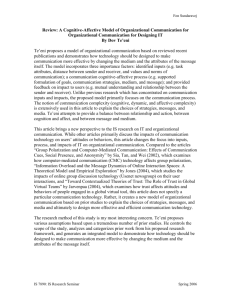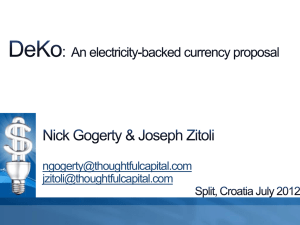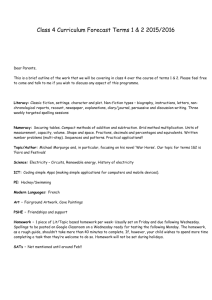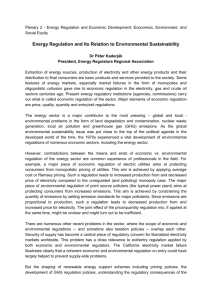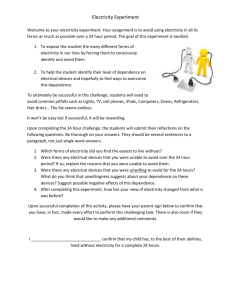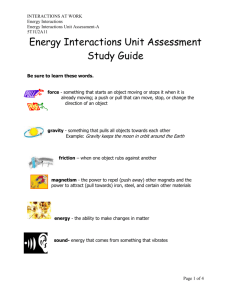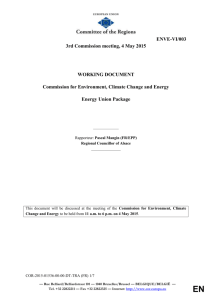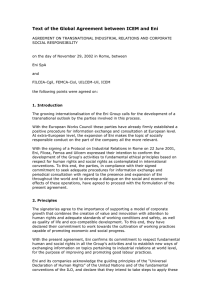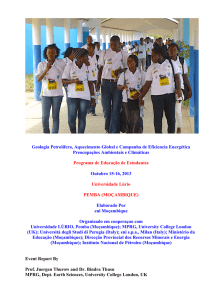DOC - Europa
advertisement
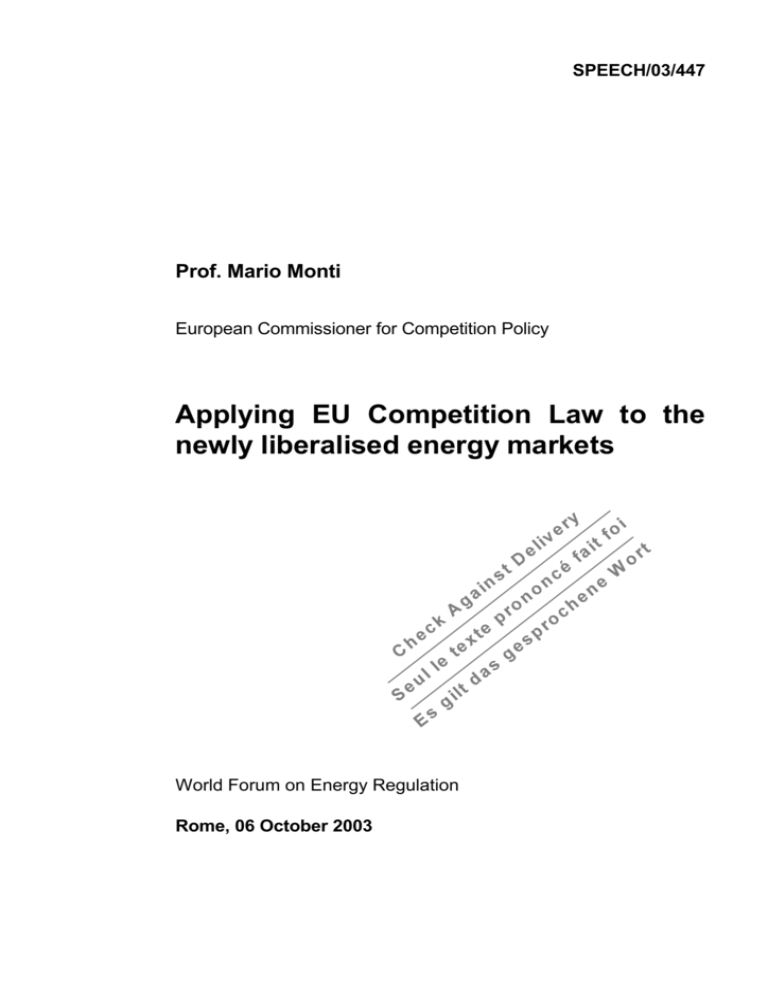
SPEECH/03/447 Prof. Mario Monti European Commissioner for Competition Policy Applying EU Competition Law to the newly liberalised energy markets World Forum on Energy Regulation Rome, 06 October 2003 It is a great honour for me to participate in this Forum. Its success in Montreal in 2000 fully justifies both the decisions to make this event a regular one, as well as the European Commission's backing to this initiative. Liberalisation and Competition Policy This edition of the Forum rightly emphasises the importance of the regulatory role in relation to energy markets. This role is indispensable for at least two reasons. First, because in these network industries the network constitutes a natural monopoly, that is to say, the duplication of the network is not economically feasible. Since supply of electricity and gas requires transport through those networks, regulatory intervention is needed to frame the activity of the network operator, even in cases where there is not a vertical integration of the network operator with a supply business. The second reason why regulatory intervention is so essential in electricity and gas markets in the European Union at the moment is their current state of liberalisation. It is vital that liberalisation is accompanied by the appropriate regulatory measures to ensure that it progresses smoothly. These measures must in particular address security of supply concerns, as the European Commission has repeatedly pleaded and proposed. I do not need to give you an example of the consequences that overlooking security of supply might have. The experience of these consequences is still very recent both in Europe and the US. Thus the importance of the Regulators' tasks is obvious. Full market opening for electricity and gas in the European Union was decided by the European Union legislator in June this year. This decision is a key element to achieve a level playing field in the European Union, so that all consumers can benefit from energy liberalisation. The current partial and different degree of market opening among Member States will disappear in 2007. I am glad to say that liberalisation of the energy markets has become irreversible in the European Union. Against this background, both European Regulatory and Competition Authorities strive to tackle the remaining barriers to an effective market, fully respecting security of supply and environmental objectives. The strengths of the regulatory and the competition approaches have the same objectives and reinforce each other. Only the instruments used by Regulators and Competition Authorities differ. However, some questions are more akin to be dealt with competition rules, while others can be better treated with regulatory instruments, as we will see later. EU competition rules are designed not only to protect the efficient allocation of economic resources, but also to promote the creation of an EU wide internal market by dealing with situations that affect trade among Member States. Barriers to competition affecting trade among Member States can derive, for instance, from contractual arrangements, such as territorial sales restrictions. I will come back to this topic in detail later on. Market integration in the EU is thus supported by the enforcement of the three main competition instruments, namely: antitrust (Articles 81, 82, and 86 EC Treaty), merger control (Regulation n° 4064/89), and state aid control (Articles 87 and 88 EC Treaty). All these instruments interact and support each other in promoting competition, notably in liberalised markets. 2 Competition policy in the energy sector In my view, at least two conditions need to be fulfilled in order to achieve a structure favourable to competition in the electricity and gas markets. These two conditions constitute our priorities when applying EU competition rules. Increasing energy supply competition As a first condition, we need to introduce and maintain a supply structure favourable to competition. This is an area where typically Regulators have less power than Competition Authorities to act. We use competition rules to protect or even improve the supply structure of electricity and gas markets removing any obstacles that prevent suppliers from competing with each other. In this sense, effective supply competition is the other side of the medal to effective customer choice. Protection of competition and of the supply structure is the rationale behind antitrust rules, but also behind merger control and State-aid rules. As a general remark, I would like to indicate that mergers can have pro-competitive effects, for example if they allow new operators to enter national markets dominated by former legal monopolies. They can, however, also have negative effects on competition for example if they strengthen the dominant position of a former monopoly. Regarding State-aid control, this also enables the Commission to ensure effective and undistorted supply competition by preventing firms from enjoying unfair financial advantages over their competitors. At the same time, antitrust rules can be used not only to protect, but also to improve the supply structure. This is true for horizontal agreements detrimental to competition, as well as vertical arrangements having negative effects on supply competition. With respect to the vertical restraints, we concentrate currently on territorial sales restrictions and clauses having similar effects, such as profit splitting mechanisms, which are particularly prevalent in gas markets. All these restrictions limit the possibilities for the buyers to resell the gas and thus to create more supply competition in the gas markets. To give you an idea of our work in practice, I will illustrate to you how we use antitrust rules, with a concrete example of a case in which we have made substantial progress very recently. As you might know, for some time we have been aware of territorial sales restrictions in supply contracts between gas producers and European wholesalers. These clauses prevent wholesalers from reselling the gas outside the countries where they are established. This breaches European competition law and undermines the on-going creation of a European gas market. Our investigations covered, among others, the relations between Gazprom, the Russian gas producer, and ENI, the Italian oil and gas company. Today, I am glad to announce that the Commission and the companies concerned have reached a settlement. This settlement was made possible because the Commission did not initiate formal procedures, as would have been the normal course of action, but allowed the companies concerned to find a commercial solution for the competition problem we identified. This goes to show that during the initial delicate transition phase from monopolised to liberalised energy markets, the focus should lie, in some occasions, on Commission's interventions improving effectively the market structure, rather than on formal procedures imposing fines. 3 The settlement reached with the companies consists of two main elements. The first relates to contractual issues, namely the amendments to remove the restrictive clauses from the existing gas supply contracts as well as the commitments for future market behaviour. The second element relates to accompanying measures to be taken by ENI to promote the creation of a real European gas market. As regards the contractual issues, it should be noted in the first place that ENI will no longer be contractually prevented from reselling outside Italy the gas it buys from Gazprom. At the same time, Gazprom will also be free to sell to other customers in Italy without having to seek ENI’s prior consent. Both companies also declared that they would not make use of territorial sales restrictions in future gas supply contracts. Concerning the accompanying measures, ENI agreed to offer significant gas volumes to new customers outside Italy. I expect that the main beneficiaries of this commitment will be consumers in Austria and Germany. The fulfilment of this commitment should lead to more liquidity in these gas markets. I consider this settlement to be a major breakthrough for the creation of a gas market in the European Union. At the same time, the settlement demonstrates that the validity of long term supply contracts – a common feature in the gas industry - is not put into doubt as long as they do not contain anti-competitive clauses. Following the example set by this settlement, I trust that Gazprom will soon bring its contracts with other European importers into line with EU competition law. I also hope that the settlement of the Gazprom/ENI case concerning supply contracts will encourage the Algerian gas producer Sonatrach to follow the same path. Sonatrach recently took the very welcome step of confirming to the Commission that it too would not make use of territorial resale restrictions in future contracts and that it would enter into commercial discussions with its customers to amend the existing contracts. I welcome these positive developments, even if the progress made in these discussions has, until now, been slow. My services therefore recently called upon Sonatrach and its contractual partners to accelerate their discussions. All in all, I believe that we have made a promising start to solving the issue of territorial sales restrictions without which the creation of a true European gas market for the benefit of European customers would remain incomplete. Network related issues I wish now to address the second condition necessary to achieve a structure favourable to competition in the electricity and gas markets. This condition is the effective, transparent and non-discriminatory access regime to energy transmission and distribution networks. Since gas and electricity networks are natural monopolies, third party access to the networks is a pre-requisite for effective competition in energy markets. Without such a regime, alternative suppliers cannot reach customers. The development of an effective third party access system requires a nondiscriminatory and cost-reflective tariff, as well as capacity allocation methods minimising refusals of access to the network in Europe. This is particularly important for cross-border trade between neighbouring Member States where transport capacity tends to be scarce, and where access refusals may be detrimental not only to competition but also to the completion of the EU internal market. 4 Third party access is of course a major task for European Regulators, who are possibly better equipped that Competition Authorities to address this issue. The Commission is assisting Regulators through the so-called Florence and Madrid Fora. By the way, the "Florence Forum" moved last year to Rome. These two Fora are gathering the main stakeholders to discuss and develop common approaches and guidelines for, among other subjects, tarification and congestion management. Contrasting with this comprehensive and possibly prescriptive and ex-ante regulatory approach, the European Commission, as a Competition Authority, can normally only prohibit particular individual behaviour and this only ex-post. However, our objective is the same, i.e. to promote effective third party access to the electricity and gas networks. With regard to the settlement reached between the Commission, Gazprom, and ENI, which I have already mentioned, we were able to come to a more constructive result also for network access. In order to settle the case, ENI has agreed to promote the increase of the capacity on the pipeline that transports Russian gas from the Austrian/Slovak border to the Italian border. ENI will also support the improvement of the third party access regime to this pipeline. The main beneficiaries of this commitment will be customers in Italy, who are interested in buying Russian gas and entering into competition with ENI. Also in the context of merger cases we have been able to address network related issues. For example, in the EDF/Hidrocantabrico merger. We noted the risk that the joint acquisition of the Spanish electricity company Hidrocantabrico by EDF would have led to the strengthening of the existing collective dominant position on the Spanish wholesale market for electricity. Having gained a foothold in Spain and with the access to Hidrocantabrico's significant electricity generation capacity, EDF would probably have resisted any increase in the commercial capacity of the interconnector which transmits electricity between France and Spain, which was already scarce. This barrier for imports would have limited the pro-competitive impact of the operation on the Spanish market. In order to eliminate these concerns, EDF undertook to substantially increase the commercial capacity up to about 4000 MW on the interconnector between France and Spain, thereby creating the conditions for greater electricity trade volumes to and from Spain, to the benefit of Spanish customers. In all of these cases the Commission carried out its investigations in close cooperation with National Authorities, be it Regulatory Authorities or National Competition Authorities. The idea was not to appropriate itself of an area of activity which is normally the primary competence of Regulators. Final remarks Allow me to underline as a conclusion the complementary and not competing nature of regulatory powers and of competition law. If Competition Authorities and Regulators in Europe, as well as in North America, combine their forces, they should be able to achieve more than each would be able to achieve on its own. This calls for close co-operation in the interest of fully competitive energy markets, notably in Europe. I hope that our discussion today will usefully contribute to the debate on regulatory and policy concerns in the energy markets. I fully support the development of this exchange of ideas, which seems to me very valuable to achieve the commonly shared objective of increasing consumer welfare. 5
